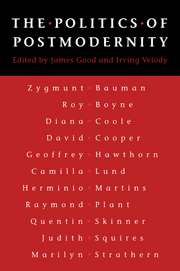Book contents
- Frontmatter
- Contents
- Acknowledgements
- Notes on contributors
- 1 Introduction: postmodernity and the political
- Part I Modernity and its vicissitudes
- Part II The critique of modernist political thought
- 6 Antinomies of modernist political thought: reasoning, context and community
- 7 Master narratives and feminist subversions
- 8 In different voices: deliberative democracy and aestheticist politics
- Part III Technology and the politics of culture
- Index
8 - In different voices: deliberative democracy and aestheticist politics
Published online by Cambridge University Press: 05 June 2012
- Frontmatter
- Contents
- Acknowledgements
- Notes on contributors
- 1 Introduction: postmodernity and the political
- Part I Modernity and its vicissitudes
- Part II The critique of modernist political thought
- 6 Antinomies of modernist political thought: reasoning, context and community
- 7 Master narratives and feminist subversions
- 8 In different voices: deliberative democracy and aestheticist politics
- Part III Technology and the politics of culture
- Index
Summary
In the past ten years we have seen an extensive ‘turn to culture’ … Within this general shift we can see a marked interest in analysing processes of symbolization and representation – the field of ‘culture’ – and attempts to develop a better understanding of subjectivity, the psyche and the self.
Michèle Barrett, Words and ThingsIntroduction
The ‘turn to culture’ which characterises recent postmodern theorising has had important ramifications for political theory and practice. For many, it has represented a turn away from politics, for others a reconceptualisation of the political. The nature of ‘the political’ has long been subject to dispute within political theory. Yet the disputes have tended to take place within a topographical framework, evaluating competing conceptions of the political as located within the state, civil society or the personal realms of life. In contrast, postmodern perspectives on the political have tended to adopt non-topographical conceptions which are dynamic and fluid. Rather than focusing on institutions, these perspectives have highlighted discursive, linguistic, psychological and performative moments of political action. On this schema, the political is neither procedural, hermeneutic nor expressive, it is aesthetic.
These aesthetic conceptions of the political have offered significant insights into contemporary society.
- Type
- Chapter
- Information
- The Politics of Postmodernity , pp. 126 - 146Publisher: Cambridge University PressPrint publication year: 1998
- 7
- Cited by

